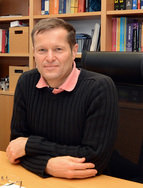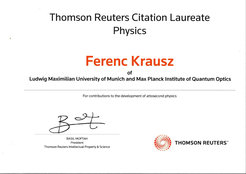Prof. Ferenc Krausz selected as 2015 Thomson Reuters Citation Laureate
Thomson Reuters, a leading company in providing intelligent information for businesses and professionals, has selected Professor Ferenc Krausz, Director at the Max Planck Institute of Quantum Optics in Garching and Chair of Experimental Physics at the Ludwig-Maximilians-Universität (LMU) Munich, as a Thomson Reuters Citation Laureate for “his contributions to the field of Physics”.

The decision on Prof. Krausz was derived from an examination of the citation data within Thomson Reuters Web of Science which is based upon the number of times other researchers have chosen to cite his scientific publications. The distinction is meant to highlight the significance the work of Prof. Krausz has in the eyes of the scientific community.
Professor Ferenc Krausz is recognized as the founder of the field of attosecond physics. In 2001 he succeeded in generating light pulses in the attosecond domain (an attosecond is a billionth of a billionth of a second) for the first time. The application of these ultrashort pulses for the observation of electrons inside atoms in 2002 was celebrated by the scientific journals Nature and Science as one of that year’s 10 most important achievements in science. These measurements have already brought amazing new insights into atomic and solid state physics.

In 2003, Professor Krausz developed a new laser technique that, using a new style of mirrors, generated light pulses consisting of only a few wave cycles with controlled waveforms for the first time. The perfectly controlled high-intensity fields of these (1fs = 10-15s) pulses exert forces on electrically charged elementary particles (electrons or protons) that are comparable to intra-atomic forces.
The high application potential of these laser pulses is being explored at the “Munich-Centre for Advanced Photonics”º(MAP), a research network carried by the LMU, TUM and the MPQ, for shedding light on the mysteries of microscopic motions and developing new biomedical techniques in the new Centre for Advanced Laser Applications (CALA) which is currently under construction on the Garching research site.
Information on Ferenc Krausz:
Born in Mór (Hungary) in 1962, Ferenc Krausz studied electrical engineering at the Budapest University of Technology and theoretical physics at the Eötvös-Loránd University in Budapest. In 1991 he received his doctoral degree in Quantum Electronics at the Vienna University of Technology, where only two years later he received his habilitation. In 1999 he was appointed full professor at the Vienna University of Technology and in 2000 he became director at the centre for “Advanced Light Sources”. In 2003 he was offered the position of director at the Max Planck Institute of Quantum Optics, where he is head of the Attosecond Physics Division. In 2004, he took over a Chair of Experimental Physics at the LMU Munich.
Professor Krausz has been the recipient of numerous scientific awards and prizes, e.g. the Gottfried Wilhelm Leibniz Prize of the Deutsche Forschungsgemeinschaft in 2005. In 2006 he was presented with the Quantum Electronics Award of the IEEE Laser and Electro-Optics Society as well as with the British “Progress Medal” of the Royal Photographic Society. In 2011 he received the “Verdienstkreuz am Bande” (order of merit) of the Federal Republic of Germany. In January 2013 he was honoured with the King Faisal International Award, in August of the same year he received the prestigious “Otto-Hahn-Preis” which is sponsored by the City of Frankfurt-am-Main, the Gesellschaft Deutscher Chemiker (GDCh) and the Deutsche Physikalische Gesellschaft (DPG).
Professor Ferenc Krausz is a member of many scientific societies and academies such as the Austrian and Hungarian Academy of Sciences and the European Academy of Sciences and Arts in Salzburg (Austria). In 2012 he was elected member of the Academia Europaea and foreign member of the Russian Academy of Sciences. Olivia Meyer-Streng

